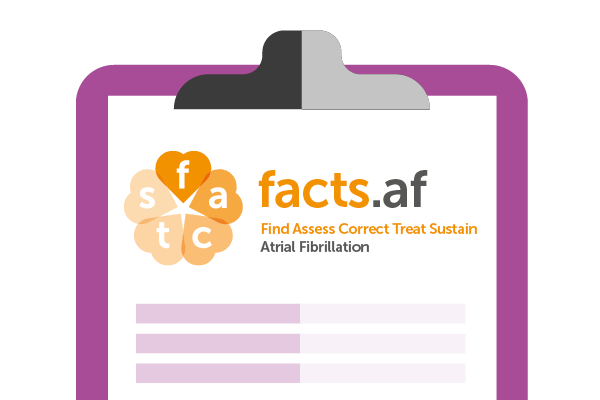Atrial Fibrillation
Atrial Fibrillation (AF) continues as part of the Cardiovascular Disease (CVD) Prevention Programme to support legacy work from the national AF programme. To see the results of that programme, please visit the AF Programme page.
Delivery in the North East and North Cumbria
AliveCor
Detection
Supporting local clinicians using the mobile ECG device, AliveCor, we supplied a number of devices from the 2018-2020 AF national programme. Further information about the use of AliveCor across NENC, particularly in novel non-healthcare settings, can be found in this report.
In 2021, Cumbria Fire and Rescue Service (FRS) and Community Cardiology Nurses won an AFA Healthcare Pioneer Award, for their work to improve the detection and treatment of AF. Cumbria FRS used AliveCor as part of their Safe and Well visits which included pulse checking, alcohol reduction, smoking cessation, social wellbeing and falls. Read more about this work.
Detection of irregular pulses during a diabetes foot check
We continue to spread learning from the ‘detection of irregular pulses during a diabetes foot check’ to all parts of the NENC area by working with the Northern Diabetes Footcare Clinical Network and beyond. Diabetes is a common condition affecting 3.4M people across England. Patients with diabetes have their pulse checked as part of their annual foot check review and all patients aged 12 and over should be offered a foot check. It is important to detect the presence or absence of a foot pulse to prevent diabetes complications.
The work was shortlisted for the Advancing Healthcare Awards 2020 in the Faculty of Public Health and Public Health England award for contributions to public health, and a case study has been requested by PHE to be shared with the World Health Organisation. For information about the pilot, download the ‘Stop a Stroke, Save a Life’ flyer. The aim is that this will become standard practice across the country, and we are contributing to work to make this happen.
Partnership Working
Protection
We worked collaboratively with Bristol-Myers Squibb (BMS) on behalf of BMS-Pfizer Alliance, to reduce AF related strokes through the optimisation of anticoagulation medicine. Although the partnership working has ceased this work is continuing, as agreed in this termination statement from BMS. Local services are being enhanced through the implementation of service improvement initiatives designed to deliver sustained improvements in the AF care pathway for patients who are registered in GP practices across the Southern Collaborative.
Resources
The 3rd edition of the AF Card Deck is available for download below. The card deck is a valuable resource for primary care, providing a step by step guide for anticoagulation treatment in AF for the prevention of stoke and systemic embolism.
Please click on the links below to download the guide in the following formats:
- A4 black and white guide or full colour guide are available for you to download and print to be incorporated into any training manuals in your practice.
- A digital version to view online – with working bookmarks and hyperlinks.
- A web app (an app that runs on a website browser), which can accessed and downloaded to your PC or smart device home screen. The app is new for this edition and provides instant access to the resource and minimises the risk of infection control by reducing paper use. View or install the web app here.
Many resources in relation to AF can be found in the National AF Toolkit, which has been produced by AHSN Network (now Health Innovation Network).
For more information about the AF element of the CVD Prevention Programme contact Kate Mackay or Nikki Holdsworth.

